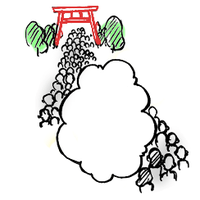24 - や まだ さん の 正月 の こと
||||しょうがつ||
||||New Year||
24 - Der Neujahrstag von Herrn Yamada
24 --Yamada-san's New Year
24 - El día de Año Nuevo del Sr. Yamada
24 - Le jour de l'an de M. Yamada
24 - Mr. Yamada's nieuwjaarsdag
24 - O dia de Ano Novo do Sr. Yamada
24 - Новый год господина Ямады
24 - Herr Yamadas nyårsdag
24日 山田元旦
24 - 山田先生的新年
24 - 亞馬達的元旦
本 を かして いただいて 、 ありがとう ございました 。
ほん|||||
||lent|received||
Danke, dass Sie mir das Buch geschenkt haben.
Thank you for reading the book.
Merci de m'avoir donné le livre.
谢谢你给我这本书。
これ を 読んで 、 日本 の 社会 や 文化 の こと が 少し わかりました 。
||よんで|にっぽん||しゃかい||ぶんか||||すこし|わかり ました
|||||society|and|culture|||||
Beim Lesen dieses Buches habe ich ein wenig über die japanische Gesellschaft und Kultur gelernt.
After reading this, I learned a little about Japanese society and culture.
En lisant ce livre, j'en ai appris un peu plus sur la société et la culture japonaises.
何 日 ぐらい で 読みました か 。
なん|ひ|||よみ ました|
Wie lange haben Sie gebraucht, um es zu lesen?
How many days did you read it?
你花了多长时间读完这本书?
一 日 で 全部 読んで しまいました 。
ひと|ひ||ぜんぶ|よんで|しまい ました
|||all||
Ich habe das ganze Buch an einem Tag gelesen.
I read it all in one day.
我在一天之内读完了整本书。
おもしろくて 、 食事 を する の も 忘れて しまいました 。
|しょくじ|||||わすれて|しまい ました
|meal|||||forgot|
Es war so interessant, dass wir vergaßen zu essen.
It was interesting and I forgot to eat.
太有趣了,以至于我们都忘了吃饭。
この 本 は 、 写真 が 多くて 、 おもしろい ので 、
|ほん||しゃしん||おおくて||
|||photographs||many||
Dieses Buch ist interessant, weil es viele Bilder enthält,
This book has a lot of pictures and is interesting, so
Ce livre est intéressant parce qu'il contient beaucoup d'images,
这本书很有趣,因为它有很多图片、
日本 の 若い 人 たち に も よく 読まれて います
にっぽん||わかい|じん|||||よま れて|い ます
||young|||||often||
Sie wird von jungen Menschen in Japan gerne gelesen.
It is often read by young people in Japan.
Il est très lu par les jeunes au Japon.
在日本,这本书深受年轻人喜爱。
この 本 に は 正月 が 大切な 行事 だ と 書いて あります ね 。
|ほん|||しょうがつ||たいせつな|ぎょうじ|||かいて|あり ます|
|||||||event|||written||
In diesem Buch steht, dass Silvester ein wichtiges Ereignis ist.
The book says that the New Year is an important event, isn't it?
Ce livre dit que le Nouvel An est un événement important.
ええ 。
Yes .
是的。
たいてい の 家 は 、 これ から 新年 の じゅんび で 忙しく なります 。
||いえ||||しんねん||||いそがしく|なり ます
Die meisten Haushalte sind jetzt mit den Neujahrsfeiern beschäftigt.
Most homes will be busy with the New Year's preparation
现在,大多数家庭都在忙着庆祝新年。
正月 は 古い 行事 が いろいろ あります か 。
しょうがつ||ふるい|ぎょうじ|||あり ます|
Gibt es viele alte Veranstaltungen zu Silvester?
Are there any old events during the New Year?
Y a-t-il beaucoup d'événements anciens au Nouvel An ?
新年有很多老活动吗?
ええ 。
Yes .
是的。
特に 地方 に は 昔 の 行事 が そのまま 残って います 。
とくに|ちほう|||むかし||ぎょうじ|||のこって|い ます
Vor allem in den ländlichen Gebieten sind die alten Bräuche noch intakt.
Especially in rural areas, old events still remain.
Dans les zones rurales en particulier, les anciennes coutumes sont encore intactes.
特别是在农村地区,古老的风俗习惯依然保存完好。
東京 の ような 都会 に も 、 お 宮 や お 寺 に おまいり する しゅうかん が あります か 。
とうきょう|||とかい||||みや|||てら||||||あり ます|
Haben Sie in städtischen Gebieten wie Tokio auch einen Shukan, um Schreine und Tempel zu besuchen?
Do you have a palace or temple in a city like Tokyo?
在东京等城市地区,您有参拜神社和寺庙的 "参拜馆 "吗?
ええ 。
おおぜい の 人 が おまいり します 。
||じん|||し ます
Viele Menschen kommen, um ihr Beileid zu bekunden.
A large number of people will come.
わたし も 、 去年 は 親類 の 子ども たち を 連れて 行きました 。
||きょねん||しんるい||こども|||つれて|いき ました
Letztes Jahr habe ich auch die Kinder meiner Verwandten mitgenommen.
Last year I also took my relatives' children with me.
去年,我还带了亲戚的孩子。
大きな 神社 へ 行った のです が 、 ひどい 目 に あって しまいました 。
おおきな|じんじゃ||おこなった||||め|||しまい ました
Wir gingen zu einem großen Schrein, aber wir machten eine schlechte Erfahrung.
I went to a big shrine, but I had a terrible eye.
我们去了一个大神社,但经历很糟糕。
どんな こと が あった のです か 。
Was ist passiert?
What happened?
怎么了?
人 が 多 すぎて 、 大変だった のです 。
じん||おお||たいへんだった|
Es war schwierig, weil es so viele Menschen waren.
It was hard because there were too many people.
这很困难,因为人太多了。
長い 間 ずっと 立った まま でした 。
ながい|あいだ||たった||
Es ist lange Zeit stehen geblieben.
I stayed up for a long time.
它一直屹立不倒。
帰り道 で は 背中 を 押さ れたり 、
かえりみち|||せなか||おさ|
On the way back, my back was pushed,
在回家的路上,我被人推倒在地、
足 を ふま れたり しました 。
あし||||し ました
Man ist mir auf die Füße getreten oder so.
I was touched by my leg.
我的脚被踩了还是怎么的?
子ども たち に 泣かれて 、 ほんとうに 困って しまいました 。
こども|||なか れて||こまって|しまい ました
Die Kinder weinten und uns war das sehr peinlich.
I was really in trouble because the children cried.
それ は 大変でした ね 。
||たいへんでした|
Das muss schwierig gewesen sein.
that must have been hard .
今度 は 、 近く の 小さな お 寺 に おまいり する つもりです 。
こんど||ちかく||ちいさな||てら||||
Das nächste Mal möchte ich einen kleinen Tempel in der Nähe besuchen.
This time, I'm going to visit a small temple nearby.
マナ さん も いっしょに いかがです か 。
How about Mana-san together?
いい です ね 。
Das ist gut.
Sounds good .
ぜひ さそって ください 。
Please come and visit us.
请邀请我们。

